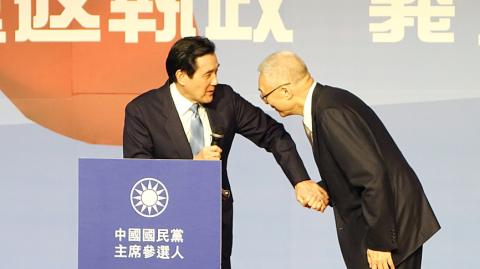Former president Ma Ying-jeou (馬英九) yesterday hurled insults at KMT Chairwoman Hung Hsiu-chu’s (洪秀柱) team and cross-strait policy platform at a solidarity rally held for Chinese Nationalist Party (KMT) chairperson candidate Wu Den-yih’s (吳敦義) campaign.
Ma took aim at a recent controversy, when it was revealed that “dummy members,” had been signed to the party en masse, saying that the practice “used to be the Democratic Progressive Party’s trick, not the KMT’s.”
Addressing accusations that members with organized crime backgrounds joined the party, Ma said the reports have had a terrible effect on the party, and such “pests” must be eradicated for the KMT to regain its “sunshine image.”

Photo: George Tsorng, Taipei Times
The KMT has “a clear understanding of right and wrong, upholds morality and takes its connections with party members seriously, characteristics that have arisen from the party’s 100-year history,” he said.
“However, there are some party comrades that have been ranting at their own brethren; there are even reports alleging that certain party members plan to launch a political vendetta against me, accusing me of being to blame for devastating the party and the nation,” Ma said.
One of the “comrades” Ma was referring to is understood to be KMT Central Policy Committee director Alex Tsai (蔡正元), who has been involved in a series of heated spats and exchanges with Ma’s office, the most recent regarding Ma’s acknowledgment that Chiang Kai-shek (蔣介石) should be held accountable for the 228 Incident.
Tsai responded that then-Taiwan governor Chen Yi (陳儀), who ordered police and military action against protesters, was less corrupt than Ma.
The vendetta that Ma mentioned is believed to relate to forums organized by Chang Ya-chung (張亞中), a close aide of Hung’s and the principal of the “Sun Yat-sen School” set up by Hung.
The school, launched at the beginning of this month, was said to be “for the appraisal of past KMT leaders and their achievements and misdeeds.”
The school evaluated former presidents Chiang Kai-shek on March 2, Chiang Ching-kuo (蔣經國) on March 9 and Lee Teng-hui (李登輝) on Thursday.
Ma is scheduled to be discussed on Thursday next week.
Ma also repeated that the so-called “1992” consensus has benefited Taiwan greatly and was “not a ‘consensus’ between the KMT and the Chinese Communist Party, but one reached, under the direction of former president Lee Teng-hui, between Taiwan’s Mainland Affairs Council and China’s Association for Relations Across the Taiwan Straits.”
“One China, different interpretations” has garnered a high level of support, he said, adding that it should not be “arbitrarily overlooked, revised or abolished.”
“It should not be changed to [Hung’s] ‘one China, same interpretation,’ which has left many of our supporters disconcerted,” Ma said.
The “1992 consensus” refers to a supposed understanding reached during the cross-strait talks in 1992 that both Taiwan and China acknowledge that there is “one China,” with each side having its own interpretation of what that means.
In 2006 former Mainland Affairs Council minister Su Chi (蘇起) admitted he made up the term in 2000, before the KMT handed power to the Democratic Progressive Party.

Taiwan has received more than US$70 million in royalties as of the end of last year from developing the F-16V jet as countries worldwide purchase or upgrade to this popular model, government and military officials said on Saturday. Taiwan funded the development of the F-16V jet and ended up the sole investor as other countries withdrew from the program. Now the F-16V is increasingly popular and countries must pay Taiwan a percentage in royalties when they purchase new F-16V aircraft or upgrade older F-16 models. The next five years are expected to be the peak for these royalties, with Taiwan potentially earning

STAY IN YOUR LANE: As the US and Israel attack Iran, the ministry has warned China not to overstep by including Taiwanese citizens in its evacuation orders The Ministry of Foreign Affairs (MOFA) yesterday rebuked a statement by China’s embassy in Israel that it would evacuate Taiwanese holders of Chinese travel documents from Israel amid the latter’s escalating conflict with Iran. Tensions have risen across the Middle East in the wake of US and Israeli airstrikes on Iran beginning Saturday. China subsequently issued an evacuation notice for its citizens. In a news release, the Chinese embassy in Israel said holders of “Taiwan compatriot permits (台胞證)” issued to Taiwanese nationals by Chinese authorities for travel to China — could register for evacuation to Egypt. In Taipei, the ministry yesterday said Taiwan

Taiwan is awaiting official notification from the US regarding the status of the Agreement on Reciprocal Trade (ART) after the US Supreme Court ruled US President Donald Trump's global tariffs unconstitutional. Speaking to reporters before a legislative hearing today, Premier Cho Jung-tai (卓榮泰) said that Taiwan's negotiation team remains focused on ensuring that the bilateral trade deal remains intact despite the legal challenge to Trump's tariff policy. "The US has pledged to notify its trade partners once the subsequent administrative and legal processes are finalized, and that certainly includes Taiwan," Cho said when asked about opposition parties’ doubts that the ART was

If China chose to invade Taiwan tomorrow, it would only have to sever three undersea fiber-optic cable clusters to cause a data blackout, Jason Hsu (許毓仁), a senior fellow at the Hudson Institute and former Chinese Nationalist Party (KMT) legislator, told a US security panel yesterday. In a Taiwan contingency, cable disruption would be one of the earliest preinvasion actions and the signal that escalation had begun, he said, adding that Taiwan’s current cable repair capabilities are insufficient. The US-China Economic and Security Review Commission (USCC) yesterday held a hearing on US-China Competition Under the Sea, with Hsu speaking on